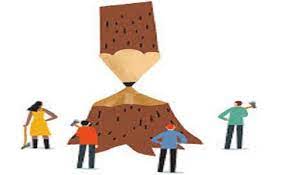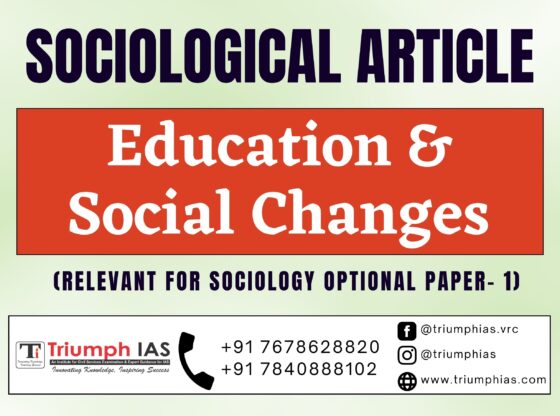Education & Social Changes
Relevant for sociology optional Paper- 1 (Unit- 10 : Sociology- Social Change in Modern Society)

Education is a crucial factor in promoting social change in India. It plays a significant role in shaping the social, economic, and cultural landscape of the country. In the context of India, education has been a key agent of social change, particularly in addressing issues like poverty, social inequality, and gender discrimination.
One of the most significant ways in which education has promoted social change in India is by providing access to education to marginalized communities. In the early years of India’s independence, the government recognized the importance of education in promoting social change and made efforts to provide access to education to all communities, particularly those that were historically marginalized. This led to the establishment of several schools, colleges, and universities across the country, making education accessible to people from all walks of life.
Education has also been a crucial tool in promoting social equality in India. By providing education to women and marginalized communities, education has empowered them to challenge social norms and break down barriers that were historically in place. Education has also played a significant role in promoting gender equality in India, particularly by providing education to girls and women. Studies have shown that educated women are more likely to participate in the workforce, have fewer children, and are less likely to be victims of domestic violence.
Apart from promoting social equality, education has also played a significant role in promoting economic development in India. By providing education and skills training to people, education has enabled individuals to participate in the workforce and contribute to the country’s economic growth. This has led to an increase in the standard of living for many individuals and has contributed to poverty reduction in India.
Education has also played a crucial role in promoting social and cultural changes in India. By providing education to individuals, education has enabled them to question traditional social norms and values and embrace new ways of thinking. Education has also been instrumental in promoting cultural diversity in India, particularly by providing education to people from different communities and backgrounds.
However, despite the significant role that education has played in promoting social change in India, several challenges still exist. One of the most significant challenges is the quality of education. While the government has made efforts to provide access to education, the quality of education provided is often inadequate, particularly in rural areas. This has led to a significant disparity in education levels between urban and rural areas.
Another significant challenge is the gender gap in education. While efforts have been made to promote education for girls and women, they still face significant barriers, particularly in rural areas. These barriers include early marriage, lack of access to transportation, and societal norms that prioritize boys’ education over girls’ education.
To overcome these challenges, India needs to adopt a comprehensive approach that promotes access to quality education for all individuals, particularly those from marginalized communities. This includes investing in infrastructure, providing quality teaching, and promoting innovative teaching methods. The government also needs to take steps to address the gender gap in education by providing scholarships and financial incentives to girls and women and addressing cultural barriers that prevent them from accessing education.
In conclusion, education is a crucial factor in promoting social change in India. It has played a significant role in promoting social equality, economic development, and cultural diversity in the country. However, several challenges still exist, particularly in terms of the quality of education and the gender gap in education. To overcome these challenges, India needs to adopt a comprehensive approach that promotes access to quality education for all individuals, particularly those from marginalized communities, and addresses the barriers that prevent girls and women from accessing education.
For more such free UPSC notes, Articles, News & Views Join our Telegram Channel. https://t.me/triumphias
Click the link below to see the details about the UPSC – Civils courses offered by Triumph IAS. https://triumphias.com/pages-all-courses.php


